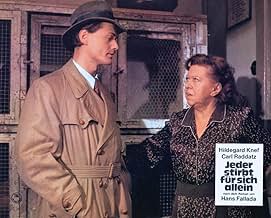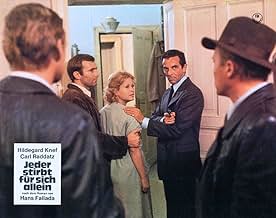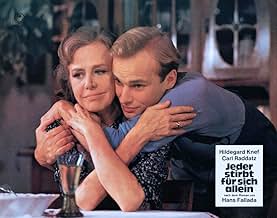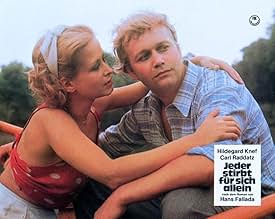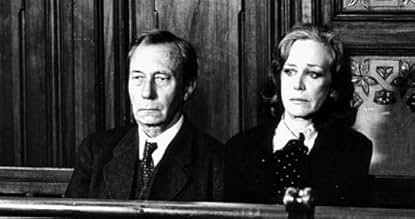Adicionar um enredo no seu idiomaWhen they start losing family members and neighbors due to World War II and the German government's policies, a quiet married couple becomes disillusioned and begins spreading leaflets again... Ler tudoWhen they start losing family members and neighbors due to World War II and the German government's policies, a quiet married couple becomes disillusioned and begins spreading leaflets against the government - a crime punishable by death.When they start losing family members and neighbors due to World War II and the German government's policies, a quiet married couple becomes disillusioned and begins spreading leaflets against the government - a crime punishable by death.
- Prêmios
- 1 vitória e 1 indicação no total
Friedrich G. Beckhaus
- Vorsitzender Richter
- (as F.G. Beckhaus)
- Direção
- Roteiristas
- Elenco e equipe completos
- Produção, bilheteria e muito mais no IMDbPro
Enredo
Você sabia?
- CuriosidadesBased on a novel that is itself based on the true story of Otto and Elise Hampel, on whom "Otto and Annna Quangel" are based.
- Erros de gravaçãoWhen Trudel puts her arms around Karl during the boat trip, her arms' positions change between shots.
- ConexõesFeatured in Ein Gespräch mit dem Kameramann Heinz Hölscher (2011)
Avaliação em destaque
Hans Fallada was one of the most famous German authors of the 20th century. When his novel KLEINER MANN, WAS NUN? (LITTLE MAN, WHAT NOW?) appeared in English in 1933, Fallada achieved fame in the English-speaking world. But after that, his memory faded, though there has been an attempt at revival of some of his works in English in the past few years. LITTLE MAN was filmed in 1934 in Hollywood by Frank Borzage, with Margaret Sullavan, and has been filmed in German in 1933, 1967, and 1973. This story was the last novel which Fallada wrote before he died prematurely in 1947. Its German title, and the original title of this film, are JEDER STIRBT FÜR SICH ALLEIN. Sometimes it is called in English EVERY MAN DIES ALONE, and sometimes EVERYONE DIES ALONE. It was originally filmed in German for television in 1962, then filmed again for German television in 1970. Then finally it was made into a full feature film with a proper budget in 1976, which is the film reviewed here. At the moment, the novel is being filmed in English under the title ALONE IN BERLIN, with Emma Thompson in the lead, directed by the French director Vincent Perez, for release in 2016. This 1976 film is devastatingly effective and brilliantly done. It succeeds largely because of the astonishing bravura performance in the lead role of Anna Quangel by Hildegard Knef. Knef (who died in 2002, aged 76) was very famous in her day. She appeared in 65 films. She commenced her acting career in 1945 as a young beauty. By the 1950s she had caused something of a sensation in America, appearing in such films as DECISION BEFORE DAWN (1951), DIPLOMATIC COURIER (1952, see my review), THE SNOWS OF KILIMANJARO (1952), and Carroll Reed's THE MAN BETWEEN (1953). Americans in those days used to speak of 'Hildegard', not bothering with her surname, and everyone knew whom they meant. In this film, she was 51 years old and very much a middle-aged actress who could not rely upon looks but had to deliver a powerful performance. And that she did! It was one of the finest roles she ever played, full of the most astonishing intensity and anguish. So powerful indeed is her performance that one imagines her having to lie down and recover after each take of several of the more demanding scenes. Emma Thompson certainly has a big challenge ahead of her if she is to come close to equalling Knef's performance as Anna Quangel. This 1976 film is one of the few German classic films to be available in English as well as German. It does not have subtitles, but is dubbed. Knef dubbed herself, which was essential and makes it work. The other dubbing is so carefully done that it is a highly superior job and does not grate on the ear. The Germans have methodically ploughed through their classic authors, filming everything with their trademark Teutonic thoroughness. Often these take the form of television series or miniseries. They rarely bother to make them available with subtitles, and foreigners never buy them and subtitle them, so a vast library of fabulous drama sits in the German vaults and is known only to the Germans themselves. They have produced far more in quantity of classic drama than the BBC, but nobody knows about it except for the Germans themselves. That seems to suit them just fine. After all, they've got their wurst and their sauerkraut, they keep all their best Rhine wines and do not export them, so who needs the rest of the world? Angela Merkel, privately known to all European diplomats as 'die Kaiserin' (female form of Kaiser), controls Europe by wagging her little finger, so the Germans really do not need to worry about the outside world, since alles ist in Ordnung. Their currency is strong, their cars are fast, and they certainly know how to 'chop the mustard', as they eat it every day. Meanwhile, so many amazing novels and stories by Thomas and Heinrich Mann, by Leon Feuchtwanger, by Stefan Zweig, by Jakob Wassermann, by Hermann Hesse, und so wieder, have been filmed with loving care, but we just don't know it (though Hesse's STEPPENWOLF with Max von Sydow has been released in an English version). As Hans Fallada might have said, 'every film is watched by Germans alone'. But back to this one. The story is an astonishing perspective of Nazism as perceived early in the War by the Germans themselves. Knef plays a woman whose son has died in the invasion of France in 1940. Until then she has been a more or less loyal supporter of Hitler, like her husband and all her friends. But then the worm turns. She begins a campaign of writing treasonable messages such as 'Hitler killed my son' on postcards which she leaves to be found in public places, until she has flooded Berlin with 221 of them. The Gestapo are jumping mad and see this as a major threat to the Hitler regime's image of total control. Someone is making monkeys, or should I say lizards, of them. And it has to be stopped at all costs. The tension mounts and mounts and mounts. The investigations intensify, the anxieties rise to a hysterical pitch. The story is a combination of a morality tale, a political satire, and a gruelling human tragedy. The film really is amazing, but you have to be strong to watch it and have nerves that can withstand the pressure. As everything becomes more and more desperate, Hildegard Knef ratchets up her emotional charge to a level where you think all the circuits will blow. Can Emma Thompson possibly equal this? This 1976 film may easily be ordered from German Amazon as a DVD, and in order to switch it to the English language soundtrack, you need to click on 'Einstellungen', which means 'settings'.
- robert-temple-1
- 29 de abr. de 2015
- Link permanente
Principais escolhas
Faça login para avaliar e ver a lista de recomendações personalizadas
Detalhes
- Tempo de duração1 hora 46 minutos
- Cor
- Mixagem de som
- Proporção
- 1.85 : 1
Contribua para esta página
Sugerir uma alteração ou adicionar conteúdo ausente

Principal brecha
By what name was Jeder stirbt für sich allein (1976) officially released in Canada in English?
Responda
